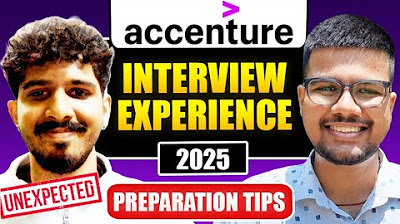Oracle Interview experience|2023 | Associate software Engineer | 19.18 LPA | Pihu | Aim2Crack
Summary
TLDRThe speaker shares their interview experience with Oracle, detailing the selection process that included an online assessment with tutorials, CPA, and coding questions, followed by interviews focusing on OOPs concepts, DBMS, and project-related inquiries. The interviewees were engaged with informative presentations and interactive sessions, leading to multiple rounds of technical and HR interviews. The candidate's preparation, including Striver's sheet and project explanation, played a crucial role in their successful selection.
Takeaways
- 📝 The candidate had a CTC of 19.1 LP with a base salary of 14.5 LP for the Oracle interview process.
- 📑 The initial step involved submitting a resume through a Google form followed by an online assessment.
- ✍️ The online assessment included 22 tutorial questions, a coding problem, and a CPA question, with a medium difficulty level.
- 🗣️ There were 65 people shortlisted for interviews after the assessment, with the candidate being one of 27 in the communication unit.
- 🕒 The interview process started with an informative PPT session, which was crucial for understanding the company and preparing for the interview.
- 🤝 The interview involved interaction with the interviewers, who asked both technical and project-related questions.
- 🔄 The candidate faced questions on OOPs concepts, DBMS, and had to demonstrate coding skills for linked list problems.
- 📈 The interview also covered OS, normalization, and deep dive into the candidate's project, emphasizing the importance of preparation.
- 📚 The candidate found Striver's sheet helpful for preparation, especially for DBMS, OS, and OOPs topics.
- 🤔 The second interview focused on additional technical topics and personal interests not mentioned in the resume.
- 🏆 The final HR round was shorter and more conversational, discussing family background and favorite subjects, before the candidate was selected.
Q & A
What was the CTC and base salary offered by Oracle in this interview experience?
-The candidate was offered a CTC (Cost to Company) of 19.1 LP (Lakhs per annum) and a base salary of 14.5 LP.
What was the first step in the Oracle interview process described in the script?
-The first step was submitting the resume through a Google form.
How many tutorial questions were there in the online assessment test?
-There were 22 tutorial questions in the online assessment test.
What type of questions were included in the online assessment test?
-The online assessment test included CPA (Case Partnering Ability) questions, coding questions, and 20 verbal ability and aptitude questions.
How many people were shortlisted for the interviews after the online assessment test?
-Around 65 people were shortlisted for the interviews.
What was the significance of attending the PPT session before the interviews?
-The PPT session was informative and engaging, providing insights about the company which helped the candidate during the interview.
What was the duration of the first interview round?
-The first interview round lasted for approximately 50 to 55 minutes.
What programming concepts were discussed during the first interview?
-The first interview covered Object-Oriented Programming (OOPs) concepts such as polymorphism, virtual functions, and also included questions on DBMS and the candidate's project.
What was the nature of the coding question asked during the first interview?
-The coding question was about finding the intersection of linked lists, with the candidate providing both an optimal approach and an alternative method.
What was the focus of the second interview round?
-The second interview focused on OOPs, OS, normalization, and DBMS, with questions related to threads, processes, and binary search trees.
What was the duration of the HR round compared to the technical rounds?
-The HR round was shorter, lasting around 35 to 40 minutes, compared to the 50 to 55 minutes of the technical rounds.
What type of questions were asked during the HR round?
-During the HR round, questions were asked about the candidate's well-being, family background, and some technical questions related to APIs and the candidate's favorite subject.
How long did it take to receive the interview results after the final round?
-The results were declared about an hour after the final HR round.
What was the candidate's strategy for answering questions about their project?
-The candidate prepared to explain their project in detail and kept their explanation ready beforehand to answer any questions about it.
Outlines

This section is available to paid users only. Please upgrade to access this part.
Upgrade NowMindmap

This section is available to paid users only. Please upgrade to access this part.
Upgrade NowKeywords

This section is available to paid users only. Please upgrade to access this part.
Upgrade NowHighlights

This section is available to paid users only. Please upgrade to access this part.
Upgrade NowTranscripts

This section is available to paid users only. Please upgrade to access this part.
Upgrade NowBrowse More Related Video

How I prepared for Amazon in just 1 Day 😱 My Amazon Interview Experience | Amazon Interview Question

Latest TCS exam and interview experience [2024 PRIME ROLE]

LTIMindtree Interview Questions Asked on 08-10-2024 | LTIMindtree Interview Experience🔥

Accenture 2025 Actual Interview: What Really Happened (Unexpected)

Hudson River Trading Interview (Software Engineer)

3+ years Java Developer Accenture Interview Experience| Java | Spring Boot | Microservices
5.0 / 5 (0 votes)